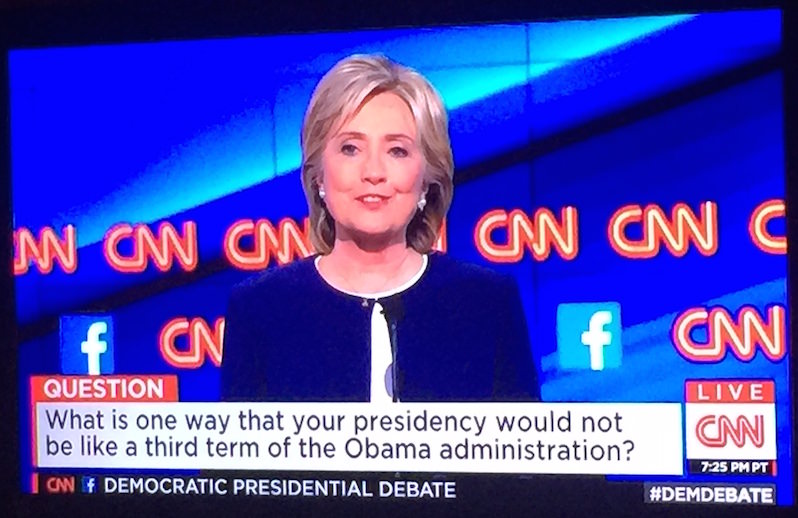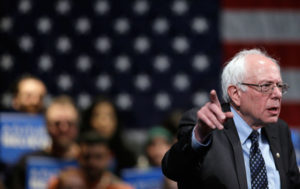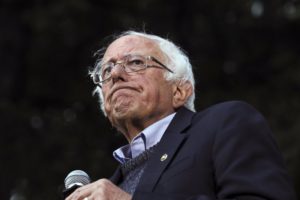The GOP Was Right to Fear Hillary Clinton
Before all the craziness—before Donald Trump and Ben Carson and the need for two-tiered debates—Republicans’ biggest fear about next year’s election was having to run against Hillary Clinton. As we saw Tuesday night, they were right to worry. Photo by Kasia Anderson
Photo by Kasia Anderson
Photo by Kasia Anderson
Before all the craziness — before Donald Trump and Ben Carson and the need for two-tiered debates — Republicans’ biggest fear about next year’s election was having to run against Hillary Clinton. As we saw Tuesday night, they were right to worry.
WATCH: Trevor Noah Slams Bernie Sanders for Not Slamming Hillary Clinton
At the Democratic candidates’ first debate, Clinton was vastly more poised and polished than her competitors. I kept thinking of basketball metaphors: LeBron James playing in a pickup game at the neighborhood playground. Clinton soaring above the rim while the others enacted scenes from “White Men Can’t Jump.” You get the idea.
Clinton commanded the stage in Las Vegas not just in style but in substance, pivoting at every opportunity to the economic issues that are likely to define the election. With more than 15 million people watching — a record for a Democratic primary debate — she talked about ways to boost sagging middle-class incomes. That’s the political sweet spot, yet Republicans don’t even aim at it.
Sen. Bernie Sanders, the Vermont independent, had a decent outing, too. His core message — that inequality is a moral issue — is powerful, and his utter lack of slickness surely played well to voters who prize authenticity. Whenever he got on a roll, his every-other-word hand gestures became so emphatic that I worried about the safety of Clinton to his left and former Sen. Jim Webb of Virginia to his right. Luckily, the podiums were widely spaced.
But Sanders stumbled when pressed to explain his record on gun control, which includes having voted against the popular Brady bill and in favor of a measure shielding gun manufacturers from product liability suits. Sanders’ excuse was that Vermont is a “rural state” where his constituents have different ideas about firearms. But there are plenty of gun lovers in upstate New York, which Clinton represented as a senator. And the same is true of parts of Maryland, where former Gov. Martin O’Malley pushed through tough gun-control laws.
Speaking of O’Malley, he certainly looked presidential enough. But his night was pretty much over when he tried to criticize Clinton’s foreign policy judgment, including her vote in favor of the Iraq invasion. She smacked him down hard by noting he had endorsed her for president in 2008. “And I consider him, obviously, a friend,” she added sweetly.
As for Webb and former Gov. Lincoln Chafee of Rhode Island, I kept wondering if they might be ushered off the stage during a commercial break and led to a separate room for their own private undercard debate, the theme of which would be “Why Am I Here?”
The main event was Clinton versus Sanders, and what should worry Republicans is that the two leading Democrats spent so much of the evening on the issues Americans say they care about. To cite one representative survey, a recent CBS poll asked registered voters what they most wanted to hear the candidates discuss. “Economy and jobs” came in first at 24 percent, while “immigration” was a distant second at 11 percent and “foreign policy” third at 10 percent.
But what do Republicans talk about in their debates? Who is going to be toughest on illegal immigration, who is more opposed to President Obama’s foreign policy, who is more determined to defund Planned Parenthood. On the economy, they fight to establish who is more opposed to raising the minimum wage.
The GOP establishment candidates have no economic message to offer beyond the party’s standard prescription of tax cuts for the wealthy and deregulation for businesses. That may be why the front-runners are Trump and Carson, who have never held public office and whose economic prescriptions are more populist.
It is a pressing fact of daily life for most Americans that middle-class incomes have fallen in the past decade and are roughly the same as they were 20 years ago. This explains why Gallup found recently that despite the economic recovery, only about half of Americans are “feeling better” about their financial situations.
How can government help the middle class? With a higher minimum wage? With a mandate for businesses to offer paid family leave? With assistance in paying for higher education, perhaps even free tuition at public universities? With trade and tax policies that encourage keeping jobs in the United States?
The Democratic candidates understand that these are the issues people care most about. Trump gets it, too, in his own bombastic way. A party that goes into the election without a compelling message on jobs and incomes — I’m talking to you, GOP establishment — is begging to lose.
Eugene Robinson’s email address is [email protected].
© 2015, Washington Post Writers Group
Your support matters…Independent journalism is under threat and overshadowed by heavily funded mainstream media.
You can help level the playing field. Become a member.
Your tax-deductible contribution keeps us digging beneath the headlines to give you thought-provoking, investigative reporting and analysis that unearths what's really happening- without compromise.
Give today to support our courageous, independent journalists.






You need to be a supporter to comment.
There are currently no responses to this article.
Be the first to respond.